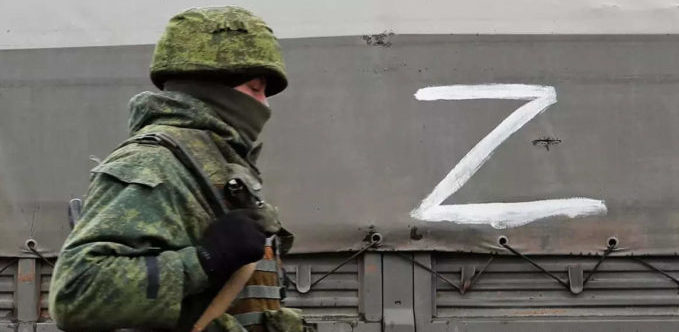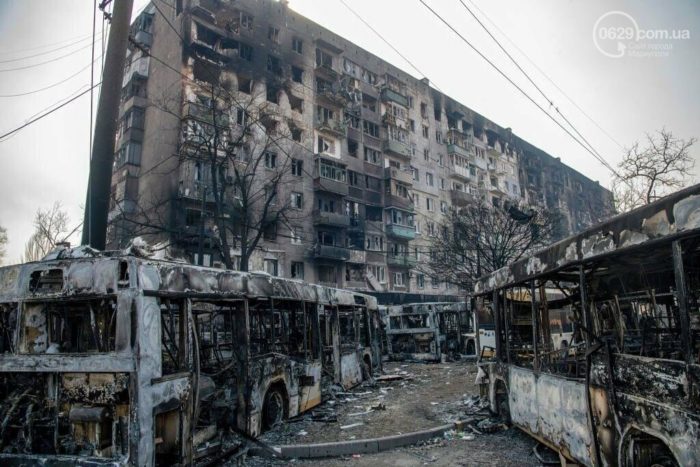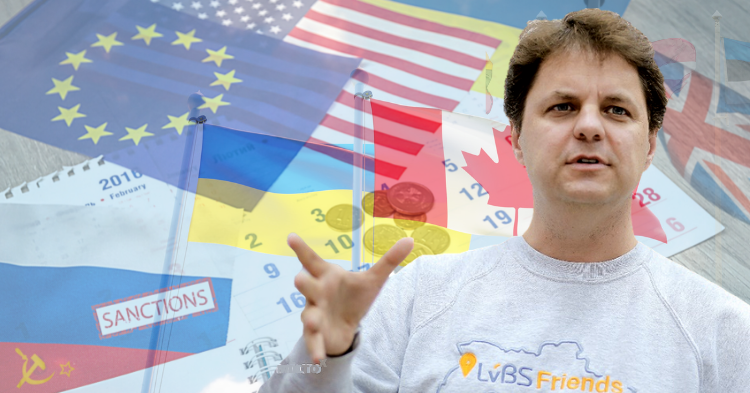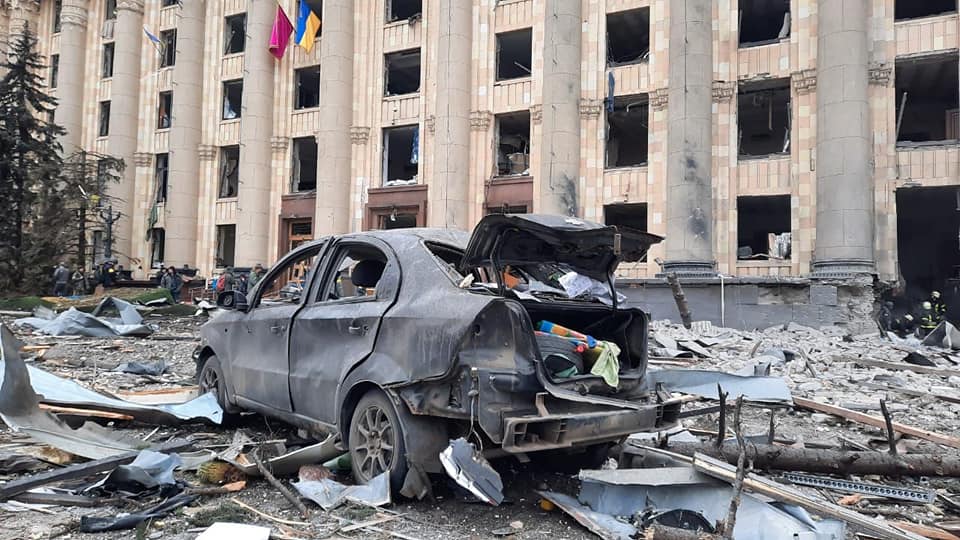As I rush towards the Potosky Palace, I forget one of the main rules of Lviv -- do not stare at your phone walking down the cobblestone streets. This historic westen Ukraine city takes its revenge for choosing a mobile screen over its Austrian architecture -- a skinned knee and bloody torn pants.
Trying to make amends before the city, I admire the majestic palace of the Pototsky family as I wait to be picked up by volunteers at its entrance. Once serving as a family palace for an influential aristocratic family, it now houses a picture gallery, an annual book fair of national importance and, for the last ten days, western Ukraine's number one humanitarian hub.
On the second day of the Russian invasion, 25 February 2022, a small volunteer group collecting humanitarian aid found shelter in the Pototsky Palace. Ten days later, 50 "permanent" volunteers and roughly 200 come-and-goers are manning four-floors-worth of humanitarian assistance trickling in from all over western Ukraine.
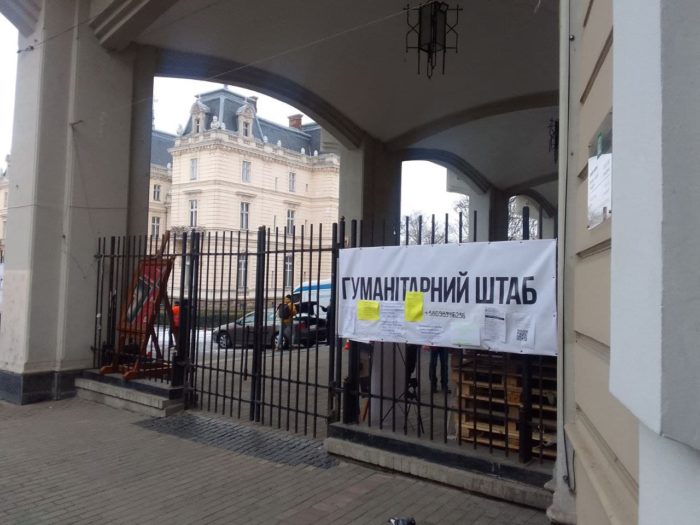
Busloads of clothes, food, medicine, sleeping bags, cooking utensils, and other necessities are unloaded in front of the 19th Century edifice and are promptly moved inside.
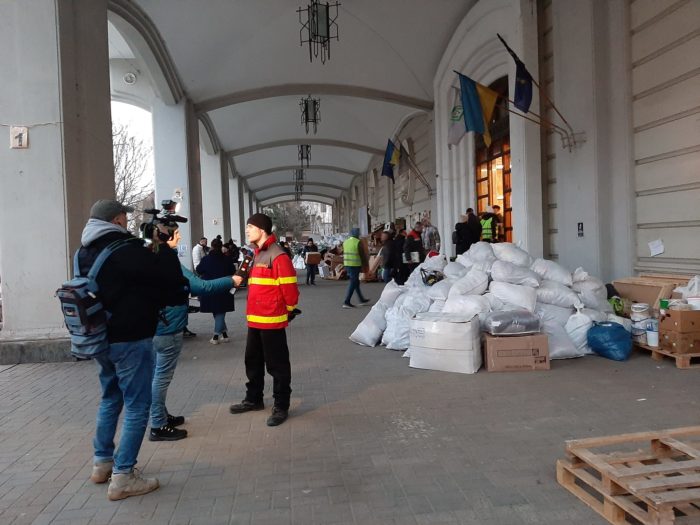
Men haul bags and boxes up a staircase to the top floor. This is the clothes distribution center, where a sea of wearables is sorted out by type, size, and gender. An easily accessible database of clothes is the outcome.
I ask if they have a spare pair of pants to replace my torn ones -- a woman with a ponytail finds six choices in my size in the space of a minute. The sorting has to be efficient -- refugees fleeing from Russian bombs and MRLS fire in eastern Ukraine wait outside, while volunteers search for the things they need, amid rooms full of cardboard boxes. Being able to find the right size quickly is essential.
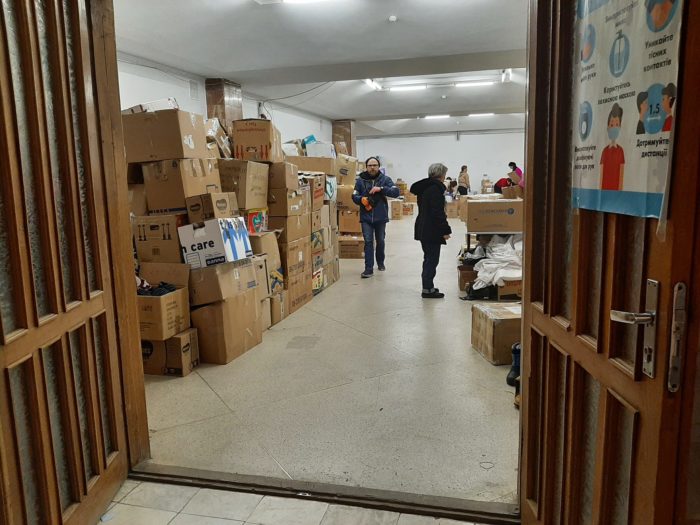
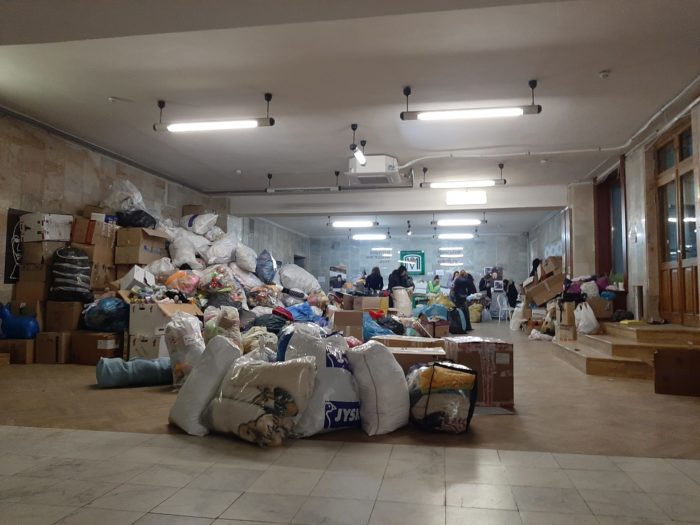
Volunteers run around stacks of things. They are the tireless army of civilians who come in after their regular work to take on a second shift at the humanitarian center. These are the ones who decide they need to do something to help the country win the war. The ones who lost their jobs because of the war. The ones who were too anxious scrolling through heir social media feeds all day, and wanted a distraction.
Two such volunteers who are part of the core staff are the husband-and-wife pair of Volodia and Hannusia. Their two kids are here, too. And so are their nephews.
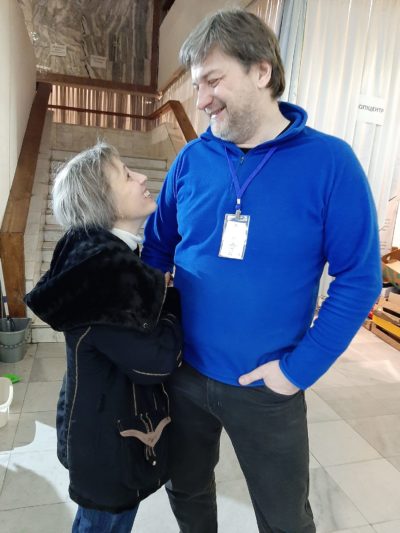
Hannusia, a mathematician by education, has a special role -- efficiency officer. And a special talent -- structuring chaos into order. She was at the center from Day One and was at the helm of steering this bustling swarm of people into something with a system, a structure, and a plan ten days later. First, the existing mobile operator network could not provide a connection to the entire flow of good-doers and help-seekers. So a way to turn around the nearby mobile tower to increase coverage was found. Then, having WiFi became essential, so Hannusia's former colleague -- who makes more than 10 times the average Ukrainian salary -- came in after his day job to do the cable work.
The copy center of the hub needs another printer, so Hannusia puts out the call on social media. There is a large flow of volunteers and materials, so Hannusia is cooperating with programmers to create an IT system to improve management. The towers of cardboard boxes were getting overwhelming, so negotiations with Ukraine's largest delivery network Nova Poshta took place to transplant the company's marking and organization system into the volunteer hub.
"It's still rather inefficient. But we've made great improvements," says Hannusia.
"When will we win?" I ask her.
"Probably sooner than in a month. Recently, the IT guys told me that the system I want will take two months to implement, and I tell them, guys, we don't have that much time!"
While leading me through towers of boxes and heaps of bags, she finds time to say hello to all the volunteers along our path. One of them is Damir, a student of Spanish heritage studying at Kyiv's theater university who left for the safer location of Lviv when Russian troops started to encircle the capital. Here he helps organize the evacuation of other fellow theater students and spends his days sorting clothes for refugees.
"When will we win?" I ask him.
"When the viewers who fund this show decide. We're all actors on the stage here and they in the West are viewing the spectacle. The decision has to be theirs," he says, true to his calling of an artist. Who is the director of the show? Damir thinks he hasn't revealed himself yet.
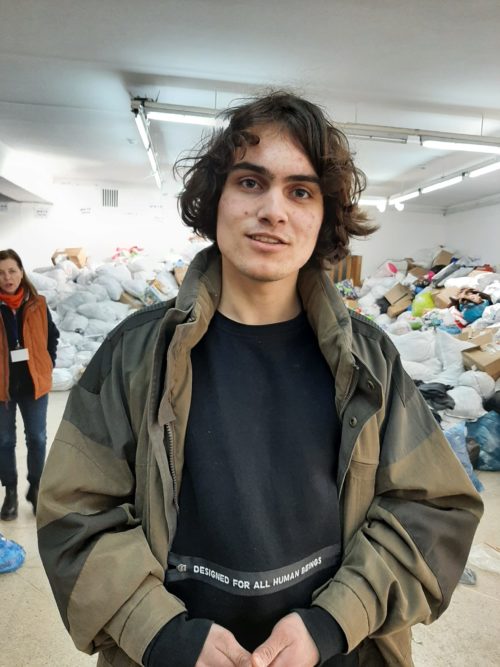
Clothes aren't the only thing the center handles. Downstairs is the food department. Food comes from businesses and ordinary people. Refugees get parcels, but larger portions are shipped to locations like orphanages. The hub not only handles requests of individual refugees but has established connections with other hubs in western Ukraine where evacuated refugees can find shelter.
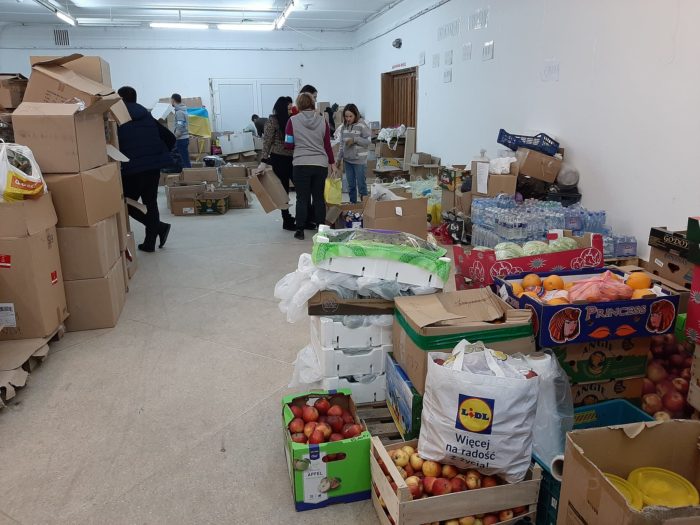
Large portions of foodstuffs donated from factories stand near homemade pickles and jams. Ordinary Ukrainians have shared their stocks with other ordinary Ukrainians who lost their homes to Russia's invasion.
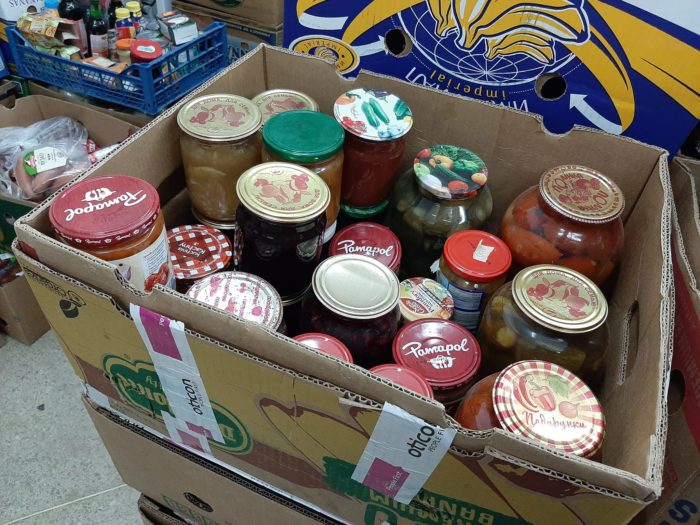
Hannusia shares with me a life hack they found for refugee kids: the small ones get a children's backpack with a set of toys. That's smart, I think, recalling how relatives bribed my two-year-old with new toys before they drove her away from Russia's war and me to Germany.
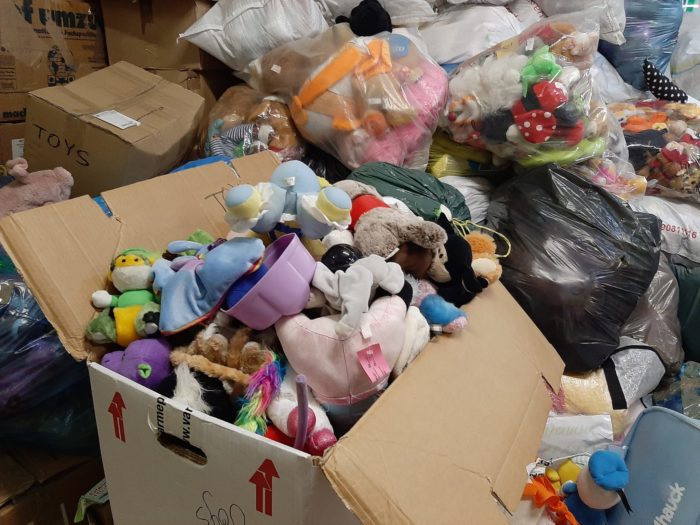
The tour goes on -- a baby food department, a stationery department, a cooking utensil department, a medicine department. The logistics and delivery departments make it all work. At the center of the operations is the "heart" -- the reception area that processes the requests as they come in, from refugees, service men and women, and other people in need.
"Of course, we have people in Lviv who are just sitting petrified at home, watching the news and finding new evidence of doom by the hour. But the volunteers who come home after their shift here don't even have the energy to read the news. They just keep working towards the victory," Volodia explains.
"When will we win?" I ask.
"I don't know when, but I understood from Day Two that this will definitely happen," Volodia answers. Why? Because of the bitter, wry, sarcastic humor that has penetrated everything related to war. Ukrainians are known for their sarcasm, and the explosion of Ukrainian obscenity-laden humor in response to the Russians' absurd attempts to justify their invasion means that the spirit is strong, the determination is there, and victory is not far, Volodia says -- humor gives power. It is power.
It is time for me to leave, but Hannusia wants me to meet one more volunteer. Oleksandr Bozhyk
is a virtuoso violinist who can play four violins at the same time. Before the Russian invasion, he toured Europe. When Russia invaded Ukraine, he applied to be a loader at the humanitarian hub.
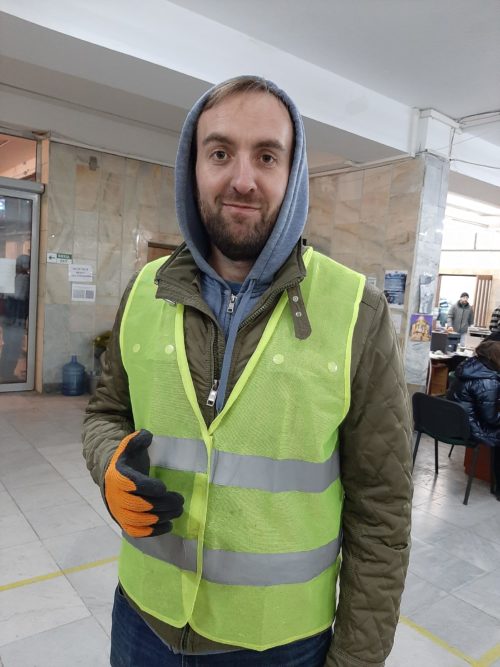
"When will we win?" I ask him.
"I hope it will be fast," he answers. Oleksandr already knows where he will play his first concert after the war ends -- at the Pototsky Palace, for all the volunteers that worked tirelessly on the home front.
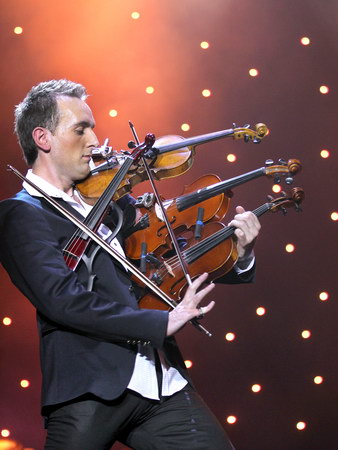
The hub inside the palace is a testimony of the Ukrainians' phenomenal capacity for self-organization in the face of danger. In some inexplicable way, people who usuallly stand by the sidelines find themselves melding into larger and more complicated structures, setting up decentralized self-governance and management systems, and drawing the entire community into the collective effort to stand united to resist injustice.
I have lived through it during Euromaidan. This is yet another manifestation of this superpower of a nation that in other ways struggles with bad governance and a rotten state system. But not here, not now. Somehow, disparate people come together to be a united power.
And that is why Ukraine will win.
Related:


